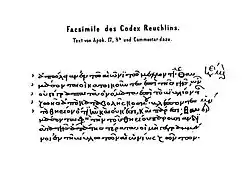Minuscule 2814
Minuscule 2814 (in the Gregory-Aland numbering), Aν20 (in Soden numbering), formerly labelled as 1rK in all catalogues,[1] but subsequently renumbered as a 2814 by Aland, is a Greek minuscule manuscript of the New Testament, dated palaeographically to the 12th century.[2]
| New Testament manuscript | |
 Facsimile of Franz Delitzsch (1861) with text of Rev 17,8 | |
| Text | Book of Revelation |
|---|---|
| Date | 12th century |
| Script | Greek |
| Now at | University of Augsburg |
| Type | Byzantine text-type |
| Category | V |
Description
The codex contains only the Book of Revelation with a commentary by Andreas of Caesarea. The last six verses were lost (22:16–21). Its text is written on a parchment in minuscule, in 1 column per page, 20 lines per page.[2]
Its biblical Greek represents the 'Andreas text', which is related to, but not a pure representative of, the Byzantine text type. Aland placed it in Category V.[3]
- Rev. 1:5
History of the codex
This codex was chiefly used by Desiderius Erasmus as a basis for his first edition of the Novum Testamentum (1516). It was the only Greek manuscript of the Book of Revelation used by Erasmus.[4] Erasmus translated the missing last six verses from the Vulgate back to Greek for his editions. As a result its readings plus his retranslation became a basis for the Textus Receptus. Erasmus borrowed the manuscript from Reuchlin, but it was lost for many years until rediscovered in 1861 by Franz Delitzsch.[5]
Kurt Aland included the manuscript to the critical apparatus in the 25th edition of Novum Testamentum Graece (1963).[6]
Formerly the codex was located in Harburg (Öttingen-Wallersteinsche Bibliothek), and was transferred together with the whole library to the library of University of Augsburg (I, 1, 4 (0), 1).[2]
References
- Gregory, Caspar René (1908). Die griechischen Handschriften des Neuen Testament. Leipzig: J. C. Hinrichs'sche Buchhandlung. p. 48.
- K. Aland, M. Welte, B. Köster, K. Junack, Kurzgefasste Liste der griechischen Handschriften des Neues Testaments, Walter de Gruyter, Berlin, New York 1994, p. 211.
- Aland, Kurt; Aland, Barbara (1995). The Text of the New Testament: An Introduction to the Critical Editions and to the Theory and Practice of Modern Textual Criticism. Erroll F. Rhodes (trans.). Grand Rapids: William B. Eerdmans Publishing Company. p. 140. ISBN 978-0-8028-4098-1.
- W.W. Combs, Erasmus and the textus receptus, DBSJ 1 (Spring 1996), 45.
- F. Delizsch, Handschriftliche Funde, Leipzig, 1861.
- Michael W. Holmes, From Nestle to the `Editio Critica Maior`, in: The Bible as Book: The Transmission of the Greek Text, London 2003, p. 128. ISBN 0-7123-4727-5
Further reading
- F. Delitzsch, Handschriftliche Funde: Die Erasmischen Entstellungen des Textes der Apokalypse (Leipzig 1861)
- Georg Grupp, Oettingen-Wallerrsteinische Sammlungen in Maihingen, Handschriften-Verzeichnis I, Noerdlingen, 1897.
External links
- R. Waltz, Minuscule 2814 at the Encyclopedia of Textual Criticism